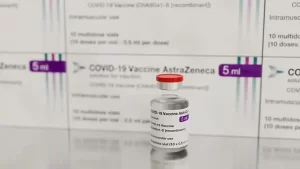Is the Galleri “Blood-Based Cancer Test” Really Effective?
- Global First: Bovine Avian Influenza Transmission to Humans Detected
- Potassium-Enriched Salt Substitutes: Reducing Blood Pressure Risk?
- Tritium Detection in Fukushima’s Seawater: Below Safety Standards
- What Reason Let AstraZeneca Withdraws COVID Vaccine From The Market?
- How Many Times Can a Cancer Patient Undergo Chemotherapy?
- What are the WHO recommendations for Japanese encephalitis vaccines?
Is the Galleri “Blood-Based Cancer Test” Really Effective?
- AstraZeneca Admits for the First Time that its COVID Vaccine Has Blood Clot Side Effects
- Was COVID virus leaked from the Chinese WIV lab?
- HIV Cure Research: New Study Links Viral DNA Levels to Spontaneous Control
- FDA has mandated a top-level black box warning for all marketed CAR-T therapies
- Can people with high blood pressure eat peanuts?
- What is the difference between dopamine and dobutamine?
- How long can the patient live after heart stent surgery?
Is the Galleri “Blood-Based Cancer Test” Really Effective?
Data from GRAIL, the cancer early screening company under the global gene sequencing giant Illumina, shows that its multi-cancer screening product “Galleri” has sold over 130,000 orders, particularly receiving a warm response from more affluent and health-conscious individuals.
Galleri claims to be the first clinically validated blood-based multi-cancer early detection (MCED) product in the screening population. It can detect over 50 types of cancer, including more than 45 for which there are no effective detection methods available. The product was introduced to the market in June 2021 and is currently priced at $949 per test.
It’s important to note that the U.S. Food and Drug Administration (FDA) granted it the “Breakthrough Device” designation in 2019 but has not yet given formal approval to this product. In fact, the FDA has not approved any MCED test to date.
Given that Galleri requires a doctor’s prescription, its sales performance reflects some level of acceptance among healthcare professionals. However, the medical community as a whole remains cautious. Lori Minasian, Deputy Director of the Cancer Prevention Department at the U.S. National Cancer Institute, said, “We’re still waiting; there’s not enough evidence yet.”
At the 2023 American Society of Clinical Oncology (ASCO) annual meeting, oncologist Brian Nicholson from the University of Oxford presented oral findings on Galleri’s clinical application. The results showed a positive predictive value of approximately 75.5%, a negative predictive value of around 97.6%, an overall sensitivity of 66.3%, and a specificity of 98.4%.

source: ASCO
A 75.5% positive predictive value means that in the population of all those testing positive, approximately three-quarters actually have cancer, with the remaining one-quarter being “false positives.” Some argue that false positive results could raise concerns, leading to unnecessary and expensive follow-up procedures.
GRAIL states that the company is working to improve the positive predictive value in future versions. Some supporters also believe that the benefits of early cancer detection with Galleri outweigh these potential concerns. The official website also notes that “a positive test result is not a diagnosis, and users should seek an evaluation from a healthcare provider.”
However, the American Academy of Family Physicians advises against such large-scale screenings without evidence, including other MCED tests. Dr. LaTasha Seliby Perkins stated that she does not offer the Galleri test to her patients because it lacks FDA approval and is too costly for patients.
In response, GRAIL emphasizes that Galleri is meant to complement, not replace recommended cancer screenings, and most insurance plans do not cover this test. Retired nurse Laura Miller stated, “If I had cancer, I would want to know the results ahead of time.”
Is the Galleri “Blood-Based Cancer Test” Really Effective?
(source:internet, reference only)
Disclaimer of medicaltrend.org
Important Note: The information provided is for informational purposes only and should not be considered as medical advice.



